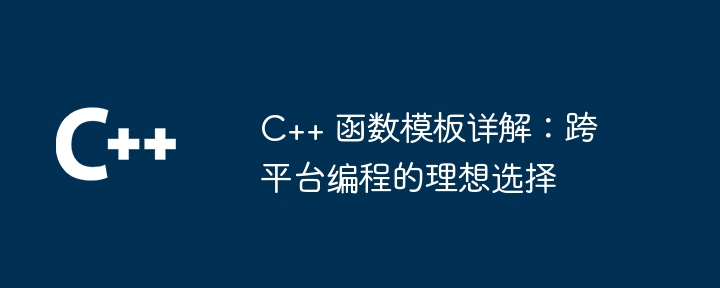
Function templates allow the creation of common function code across different data types, making them ideal for cross-platform programming. It uses template parameters to specify the data type the function operates on and instantiates the function based on the specific data type used. For example, a template function that calculates the maximum value can be used for integers and floating point numbers, and the compiler will automatically generate function instances for each data type, simplifying the code and providing generality.

Detailed explanation of C function templates: an ideal choice for cross-platform programming
Function templates are a powerful feature in C. Allows you to create generic function code that works on different data types. This makes it ideal for application development that needs to be cross-platform or handle different types of data.
Template Syntax
Function templates are defined using the following syntax:
template <typename T>
returnType functionName(parameters) {
// 函数体
}Where:
is a template parameter that specifies the data type the function will operate on. is the return value type of the function. is the name of the function. is the parameter list of the function. Function Template Instantiation
When you use a template function, the compiler generates a specific instance of the function for each specific data type you use. For example, if you have a template function that handles integers:template <typename T>
int max(T a, T b) {
return (a > b) ? a : b;
}int type:
int maxInt(int a, int b) {
return (a > b) ? a : b;
}Practical Case
Let us consider a program that calculates the maximum value of two numbers. This can be easily accomplished using template functions:template <typename T>
T max(T a, T b) {
return (a > b) ? a : b;
}
int main() {
int i1 = 10, i2 = 20;
float f1 = 12.5, f2 = 15.2;
// 使用模板函数
cout << "Maximum of integers: " << max(i1, i2) << endl;
cout << "Maximum of floats: " << max(f1, f2) << endl;
return 0;
}max works for integers and floating point numbers. The compiler will automatically instantiate functions for each data type, simplifying code and providing commonality across different data types.
The above is the detailed content of Detailed explanation of C++ function templates: ideal for cross-platform programming. For more information, please follow other related articles on the PHP Chinese website!
 What are the differences between c++ and c language
What are the differences between c++ and c language
 Recommended learning order for c++ and python
Recommended learning order for c++ and python
 Cost-effectiveness analysis of learning python and c++
Cost-effectiveness analysis of learning python and c++
 Is c language the same as c++?
Is c language the same as c++?
 Which is better to learn first, c language or c++?
Which is better to learn first, c language or c++?
 The difference and connection between c language and c++
The difference and connection between c language and c++
 C++ software Chinese change tutorial
C++ software Chinese change tutorial
 Cost-effectiveness analysis of learning python, java and c++
Cost-effectiveness analysis of learning python, java and c++




